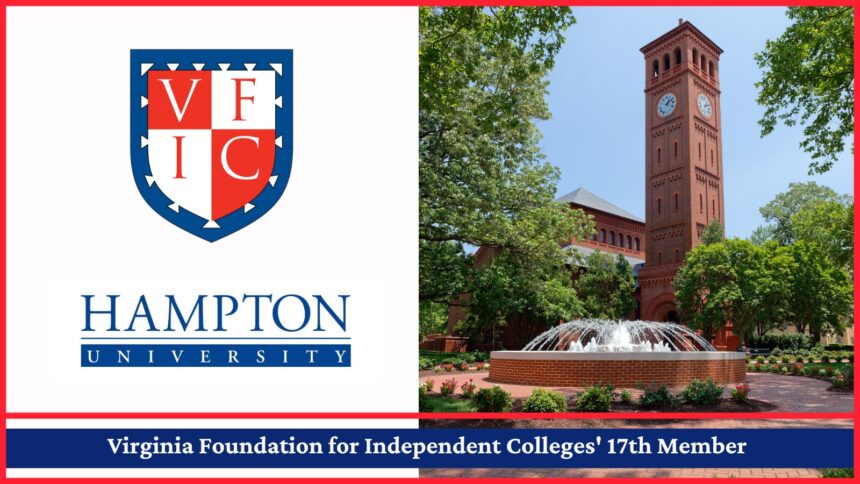Courtesy of Hampton University
Hampton University, an HBCU located in Hampton, Virginia, officially became the seventeenth member of the Virginia Foundation for Independent Colleges (VFIC) on June 3, 2023. Hampton University is a dynamic, progressive institution of higher education, providing a broad range of technical, liberal arts, and graduate degree programs. In addition to being one of the top historically Black universities in the world, Hampton University is a tightly-knit community of learners and educators, representing 49 states and 35 territories and nations.
This new affiliation is the result of a discussion between Matthew Shank, Ph.D., president of the VFIC, and LTG (ret) Darrell K. Williams, president of Hampton University. The VFIC extended an invitation to Hampton University to join the consortium, and the Foundation’s leadership unanimously approved the measure at its annual meeting in early June. VFIC board members recognize the aligned missions of Hampton University and the other sixteen schools in the consortium: to teach a broadly pragmatic liberal arts and sciences education in environments that value and encourage ethical leadership and responsible citizenship.
“Our priorities align closely with the VFIC’s mission, which is to provide a top-quality and affordable education as we prepare tomorrow’s global leaders,” says LTG (ret) Darrell K. Williams, the thirteenth president of Hampton University. “Virginia’s private colleges and universities offer a unique academic experience and are critical to the creation of a diverse and inclusive workforce.”
Hampton University was founded on April 1, 1868, as Hampton Normal and Agricultural Institute by Brigadier General Samuel Armstrong, Superintendent of the Freedmen’s Bureau of the Ninth District of Virginia. Symbolized by the historical Emancipation Oak, the school’s mission emphasized the lasting promise of education for all, even in the face of adversity. Today, Hampton University is engaged in “Elevating Hampton Excellence,” a 2023-2033 strategic plan that aims to elevate academic excellence, increase research and innovation, improve operations and infrastructure, and increase financial sustainability.
Research and public service are integral parts of Hampton’s mission. In order to enhance scholarship and discovery, the faculty is engaged in writing, research, and grantsmanship. Faculty, staff, and students provide leadership and service to the University, as well as the global community. In achieving The Virginia Foundation for Independent Colleges
901 East Byrd Street, Suite 1625 804.288.6609 Richmond, VA 23219 www.vfic.org its mission, Hampton University offers exemplary programs and opportunities that enable students,
faculty, and staff to grow, develop, and contribute to our society in a productive and useful manner.
“The entire VFIC family is honored to welcome President Darrell Williams and Hampton University into our excellent consortium,” says Nancy Agee, CEO of Carilion Clinic and chair of the VFIC. “The VFIC will certainly benefit from adding such an outstanding university to our ranks and Hampton will also gain from collaborating with our other sixteen leading independent colleges and universities in Virginia. We look forward to establishing a strong and longstanding partnership with Hampton University.”
For more information, please contact Matt Shank, Ph.D., president of the Virginia Foundation for Independent Colleges. You can reach him at shank@vfic.org.
About the Virginia Foundation for Independent Colleges
Established in 1952, the Virginia Foundation for Independent Colleges (VFIC) aims to advance the distinctive values and strengths of the seventeen colleges across Virginia that make up our consortium. We accomplish this goal by generating financial support for our schools – more than $170 million since our inception. Leveraging those resources, we establish and administer a range of programs that help our schools attract the best and brightest, create a vibrant and rigorous educational experience, prepare students for a fulfilling career, and cultivate responsible leaders for the communities they call home.
The following seventeen schools make up our consortium: Bridgewater College, Emory & Henry College, Hampden-Sydney College, Hampton University, Hollins University, Mary Baldwin University, Marymount University, Randolph College, Randolph-Macon College, Roanoke College, Shenandoah University, Sweet Briar College, University of Lynchburg, University of Richmond, Virginia Union University, Virginia Wesleyan University, and Washington and Lee University. These schools educate nearly 30,000 students, 24,000 of whom are undergraduates. Of the fifteen chapters of Phi Beta Kappa in Virginia, nine reside on VFIC campuses. Thirty percent of undergraduates from VFIC schools graduate with a
STEM-H degree.
VFIC schools are racially, culturally, and economically diverse. According to current research from the State Council of Higher Education in Virginia, 42 percent of VFIC undergraduates come from minority backgrounds. Thirty percent of undergraduates receive a PELL Grant. The mean income for these students, depending on the school, ranges from $29,000 to $38,000/annually. With enrollments between 350 and 3,500 students, our schools teach a broadly pragmatic liberal arts and sciences
education in environments that value and encourage ethical leadership and responsible citizenship.

